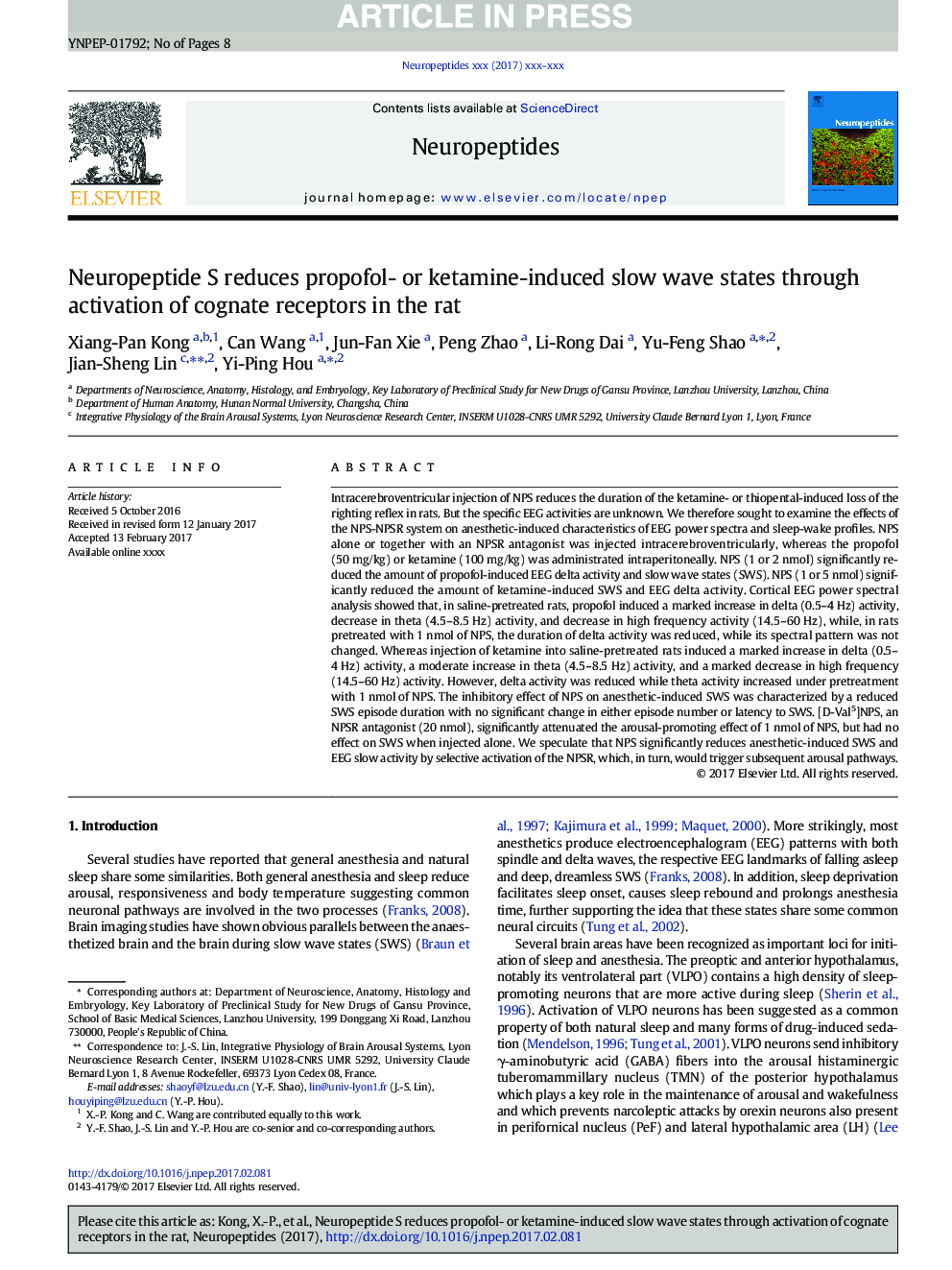| کد مقاله | کد نشریه | سال انتشار | مقاله انگلیسی | نسخه تمام متن |
|---|---|---|---|---|
| 8633641 | 1569059 | 2017 | 8 صفحه PDF | دانلود رایگان |
عنوان انگلیسی مقاله ISI
Neuropeptide S reduces propofol- or ketamine-induced slow wave states through activation of cognate receptors in the rat
دانلود مقاله + سفارش ترجمه
دانلود مقاله ISI انگلیسی
رایگان برای ایرانیان
موضوعات مرتبط
علوم زیستی و بیوفناوری
بیوشیمی، ژنتیک و زیست شناسی مولکولی
علوم غدد
پیش نمایش صفحه اول مقاله

چکیده انگلیسی
Intracerebroventricular injection of NPS reduces the duration of the ketamine- or thiopental-induced loss of the righting reflex in rats. But the specific EEG activities are unknown. We therefore sought to examine the effects of the NPS-NPSR system on anesthetic-induced characteristics of EEG power spectra and sleep-wake profiles. NPS alone or together with an NPSR antagonist was injected intracerebroventricularly, whereas the propofol (50Â mg/kg) or ketamine (100Â mg/kg) was administrated intraperitoneally. NPS (1 or 2Â nmol) significantly reduced the amount of propofol-induced EEG delta activity and slow wave states (SWS). NPS (1 or 5Â nmol) significantly reduced the amount of ketamine-induced SWS and EEG delta activity. Cortical EEG power spectral analysis showed that, in saline-pretreated rats, propofol induced a marked increase in delta (0.5-4Â Hz) activity, decrease in theta (4.5-8.5Â Hz) activity, and decrease in high frequency activity (14.5-60Â Hz), while, in rats pretreated with 1Â nmol of NPS, the duration of delta activity was reduced, while its spectral pattern was not changed. Whereas injection of ketamine into saline-pretreated rats induced a marked increase in delta (0.5-4Â Hz) activity, a moderate increase in theta (4.5-8.5Â Hz) activity, and a marked decrease in high frequency (14.5-60Â Hz) activity. However, delta activity was reduced while theta activity increased under pretreatment with 1Â nmol of NPS. The inhibitory effect of NPS on anesthetic-induced SWS was characterized by a reduced SWS episode duration with no significant change in either episode number or latency to SWS. [D-Val5]NPS, an NPSR antagonist (20Â nmol), significantly attenuated the arousal-promoting effect of 1Â nmol of NPS, but had no effect on SWS when injected alone. We speculate that NPS significantly reduces anesthetic-induced SWS and EEG slow activity by selective activation of the NPSR, which, in turn, would trigger subsequent arousal pathways.
ناشر
Database: Elsevier - ScienceDirect (ساینس دایرکت)
Journal: Neuropeptides - Volume 63, June 2017, Pages 59-66
Journal: Neuropeptides - Volume 63, June 2017, Pages 59-66
نویسندگان
Xiang-Pan Kong, Can Wang, Jun-Fan Xie, Peng Zhao, Li-Rong Dai, Yu-Feng Shao, Jian-Sheng Lin, Yi-Ping Hou,